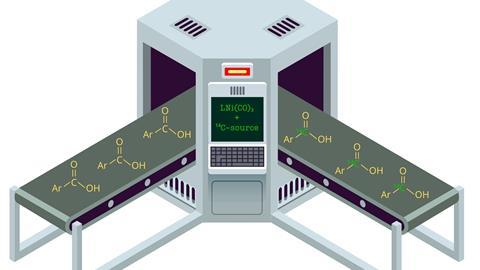Using a nickel catalyst and a commercial carbon-14 source, it is easy to radioactively label carboxylic acids, reports Nature Chemistry.
In drug development, it is important to know where in the body a drug ends up when it is administered to a patient. One way of doing this is to incorporate carbon isotopes (13C or 14C) into the pharmaceutically active molecule. Carbon forms the molecular backbone of almost all drugs and is therefore well suited to this type of labelling. The difficulty, however, lies in the labelling itself.
Usually, 13C or 14C is introduced into a molecule via the gases CO or CO2. But working with (toxic) gases that are also radioactive is a lot of work. Researchers from the pharmaceutical company Merck and Canada’s McGill University have now developed a method that makes the labelling process much easier and safer. They discovered that in the case of carboxylic acid groups [R(C=O)OH], you can also use a nickel catalyst in combination with a commercial source of 13C or 14C.
These are the readily available catalysts Ni(COD)2 and LNi(CO)3, where L is a phosphine. This catalyst is dissolved in the carboxylic acid to be labelled and labelled with benzoyl chloride (or similar). The catalyst exchanges its phosphine for a chloride, then ‘picks’ the C=O part of the labelled molecule and then exchanges it with the C=O group of your target molecule, eventually leaving you with a mixture of labelled and unlabelled target and source molecules. Separate these and you can then use your labelled target molecule for your intended purpose.
This method is broadly applicable to all types of carboxylic acids: alkyl, benzyl, aryl, heteroaryl and vinyl groups are all possibilities. The conversion rate is around 30% (a high level, according to the researchers) and yields between 75 and 99%. The team also shows that the method can also be used to label already developed drugs or natural products. Radioactive gas and expensive equipment are no longer needed.
Kinney, R.G. et al. (2024) Nat. Chem., DOI: 10.1038/s41557-024-01447-7













Nog geen opmerkingen